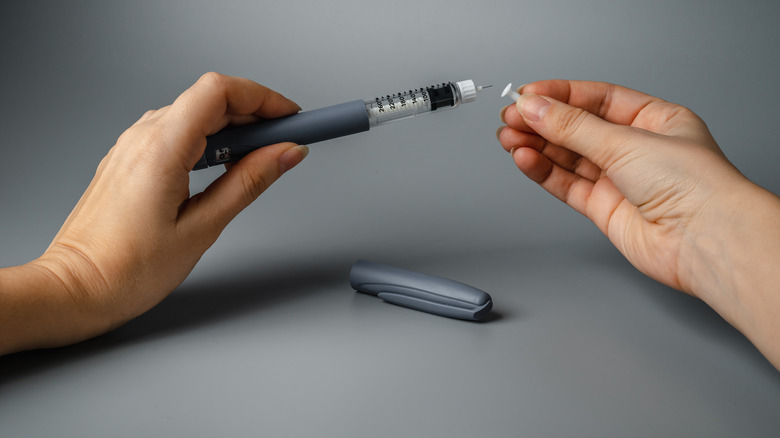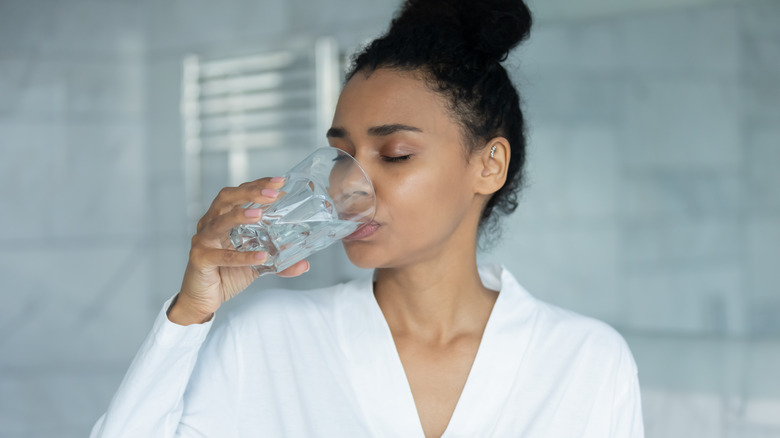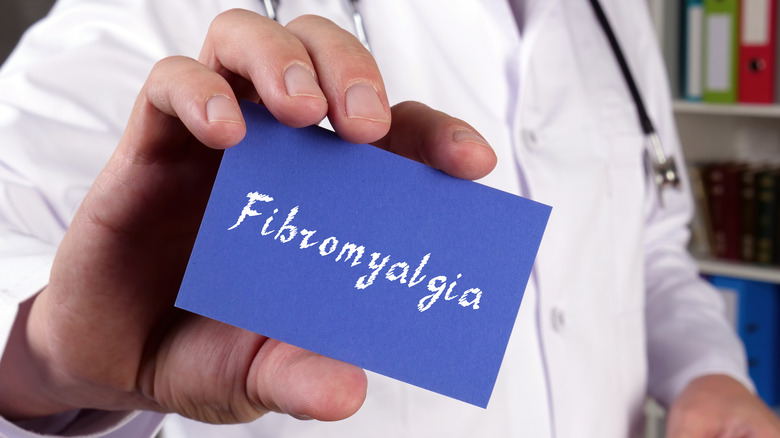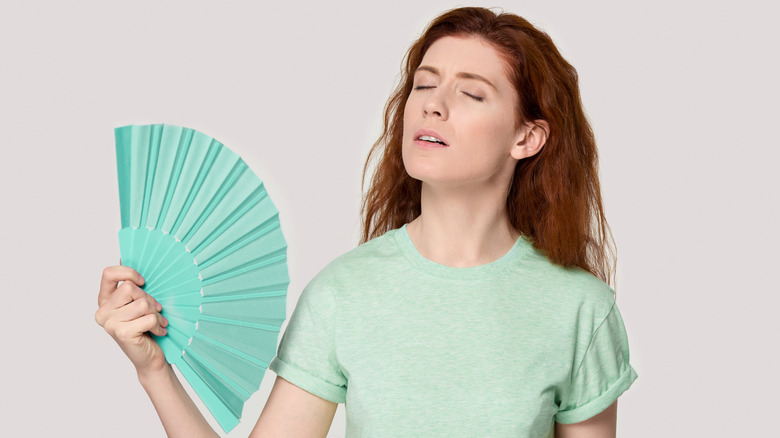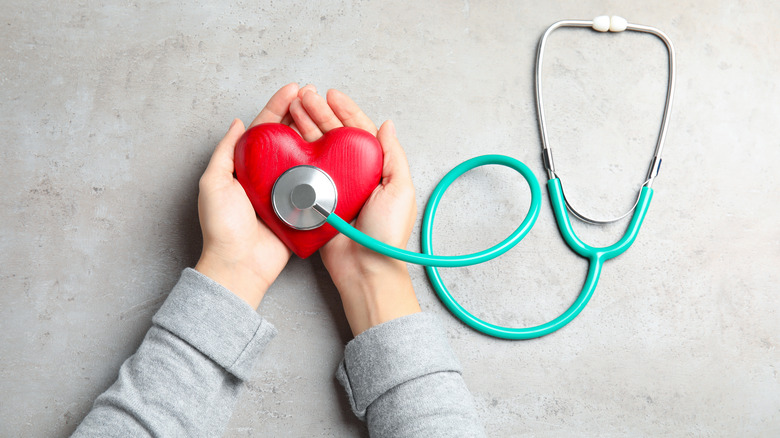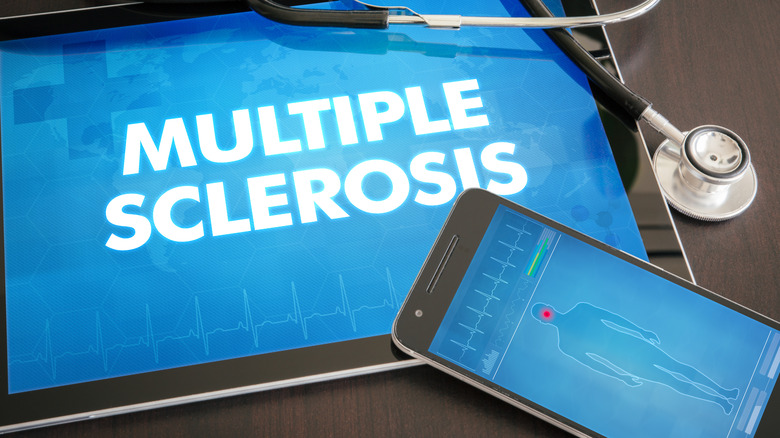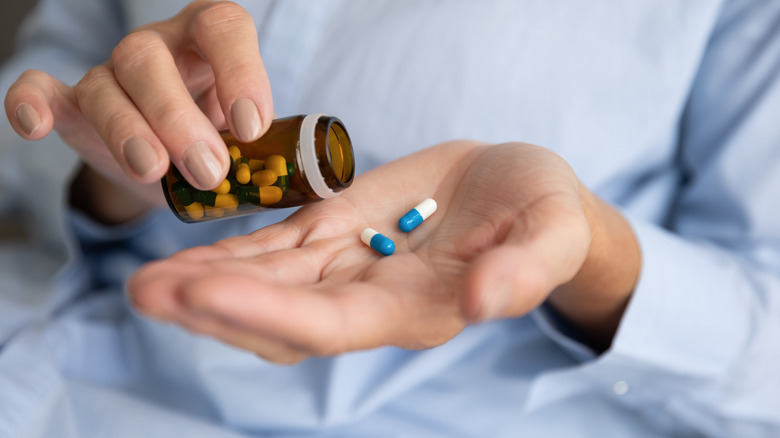What It Really Means When You're Hot All The Time
You're at your computer, typing away when suddenly you feel uncomfortable as if someone turned the dial up on the radiator. Soon, sweat droplets start forming on your forehead, and when you touch your face, it feels unusually warm. Remembering that your throat was a bit sore the other day, you groan and get a thermometer.
Fevers are never fun, but they are an important defense mechanism for your body. As WebMD explains, when your temperature goes up, it could mean you have a virus or a bacterial infection. And to clear up any slight confusion, no, the infection itself doesn't create the fever. Your body turns up the heat as a way to kill off microscopic foreign invaders. With that said, if your fever spikes to 103 degrees Fahrenheit or higher, you should contact your doctor. And if a fever is accompanied by other symptoms like seizures, confusion, a severe headache, or a stiff neck, get yourself to the emergency room right away.
While fevers are an extremely common reason someone might be feeling flushed, it's hardly the only reason. Sometimes, it's connected to something very natural and so easy to address. But just as pain can be a warning that something's wrong, your body turning up the heat might be because of a medical condition or an immediate health concern.
Insulin resistance
In a perfectly functioning human body, your pancreas would make a certain amount of insulin, which would be processed correctly and keep you functioning at peak capacity. Unfortunately, if you're insulin resistant, your liver, as well as your fat and muscles, partially reject your natural insulin, forcing your pancreas to make higher than normal amounts to compensate (via WebMD). Think of like a fussy baby throwing half their strained carrots against the wall. You would need to make twice as much food to get them to eat the right amount at mealtime.
Unfortunately, when your body resists insulin, it's difficult to keep your blood sugar levels from getting too high, and that alone can make you feel hot (via Prevention). "Sweat and the sensation of heat intolerance is more common in those who are prediabetic or insulin resistant," Dr. Rebecca Booth, a board-certified obstetrician and gynecologist. And, yes, without lifestyle changes to adjust for insulin resistance, you could wear out your pancreas and become diabetic (via WebMD).
Besides hot flashes, other signs that you might be insulin resistant include having skin tags and blood pressure readings of at least 130/80. If you're a man with a waistline over 40 inches in diameter and an HDL cholesterol level that is below 40 mg/dL, you should speak to your doctor about possibly being insulin resistant. These numbers are slightly different for women (over 35-inch waistline and HDL cholesterol below 50 mg/dL).
Dehydration
When we watch athletes during a sporting event, we're not surprised if they need to stop for water or a sport's drink. After all, that much exercise (especially if it's outside on a hot day) is bound to make someone sweat, and you need to replenish all that lost fluid somehow. But even severe dehydration is not limited to the athletic, and you don't want to take "a little thirstiness" lightly especially if you're feeling hot.
As Medical News Today explains, if you have a chronic illness like an adrenal gland disorder or kidney disease, you are more susceptible to becoming dehydrated. Where you live can also make a difference. For example, a person whose home is up on the side of a tall hill or mountain is more susceptible to dehydration than a person living at sea level or in a valley. Yes, severe dehydration, in which you've lost as much as 15% of the total water in your body, can cause a fever, as well as delirium, low blood pressure, and even unconsciousness.
A good way to avoid major complications from dehydration is to watch for early warning signs that your body needs more fluids (via Medical News Today). Besides being thirsty, if you're not urinating as often as you normally would, and when you do use the bathroom, your urine is a dark color, you definitely need to drink water or an electrolyte beverage. If you start running a fever because of dehydration, seek medical help immediately.
Perimenopause
Before we dive into this one, it's important to understand the difference between being premenopausal and perimenopausal. During premenopause, a woman is still menstruating and although her body may be going through some hormonal changes, she's not experiencing the symptoms usually associated with going through the change of life (via Healthline). Perimenopause, however, is when a woman's body begins producing less of the hormone estrogen, and while this still isn't considered menopause, it often involves hot flashes.
Yes, perimenopause and menopause share many of the same symptoms, including feeling uncomfortably hot, explains Healthline. Other side effects of both hormonal states include difficulty sleeping (which the hot flashes do not help) and mood swings. And while a woman's 28-day cycle can function like clockwork, perimenopause varies widely from person to person. Some women may only experience it for a few months. Others, however, may be in this state for up to four years.
Although a woman can still become pregnant if she's perimenopausal, she may have difficulty conceiving (via Healthline). Tracking her period may become more challenging since the spikes and drops in her estrogen levels can cause her time of the month to become irregular. In addition, she may find that when she does menstruate, she has a lighter or heavier flow than she has had in the past. And PMS, and its unpleasant symptoms, may become more severe.
Panic attacks
One of Batman's most iconic villains is the Scarecrow because he is able to weaponize fear. And while this member of Gotham's rouges' gallery isn't something we need to worry about, panic attacks are a real and a significant health issue (via WebMD). And, yes, a sign you're experiencing this condition is feeling warm.
According to WebMD, a panic attack involves four or more different symptoms, including but not limited to hot flashes, pain in your chest, a rapid heartbeat, nausea, shaking, difficulty catching your breath, and perspiration. Emotionally, you may experience a sudden fear that you're going to die or that you're going to lose your sanity. And if you experience two or more of these episodes in a year's time and become preoccupied with avoiding future attacks, you may have a type of anxiety disorder called panic disorder.
One word of caution: A stroke, a heart attack, and a panic attack can all feel very similar (via WebMD). Does that mean you shouldn't go to the emergency room or seek medical help if you're not sure which one you're experiencing? Absolutely not! You cannot afford to cross your fingers and hope it's only a panic attack. And just because a panic attack can pass in five to 10 minutes, that doesn't mean you still shouldn't speak with your health care professional about them. Remember, panic disorders can take a mental and emotional toll over time.
Hyperthyroidism
Revving up your metabolism is usually positive for your overall health. After all, a faster metabolic rate means you process food into energy efficiently, which can help with weight management. But all of that goes out of the window if it speeds up too much. This condition is known as hyperthyroidism (via Healthline).
Quick bio lesson: Your thyroid is a small gland located in your neck that helps regulate your metabolic rate. It does this by manufacturing the hormones tetraiodothyronine (T4) and triiodothyronine (T3). But if the thyroid goes into overdrive and starts making too much of these hormones, then your body goes into a hypermetabolic state. And among symptoms like both your blood pressure and heart rate going up, your hands shaking, and you needing to move your bowels more often, you also will be less tolerant of heat. In other words, you'll feel hot!
Other side effects of hyperthyroidism to watch out for include difficulty concentrating, feeling nervous and restless, hair becoming brittle and falling out, sleeping issues, feeling weak, stomach problems (vomiting and nausea), itchiness, and, in some cases, developing a goiter on the neck (via Healthline). Additionally, a possible cause of hyperthyroidism is having tumors on either the ovaries or the testicles. If you think you might have this condition, speak with a health care professional right away.
Cancer
Okay, don't worry just yet. There are many reasons why someone may have night sweats. But for men, it could be a sign that your body is battling cancer (via Men's Health). Now, again, don't worry. This is rare. But it's always important to be aware of all the possible reasons your body might not be functioning as it should.
Dr. Jonathan Arend, an internist at The Mount Sinai Hospital in New York, told Men's Health that even if you're not aware you have cancer, your body can still tell when something is wrong. Just like your immune system will turn up the heat to battle viruses and bacteria, it may take a similar approach if you have a tumor. And as Dr. Vineeth Mohan, an endocrinologist, pointed out, pheochromocytoma is a type of tumor that secrets chemicals that can put you into "fight or flight" mode. Think of it like a tumor that gives you an adrenaline rush, which, of course, means you'll be sweating and feeling the heat.
In addition, Dr. Mohan said night sweats could be caused by carcinoid syndrome where tumors appear in your gastrointestinal tract (via Men's Health). But don't jump to the worst conclusions if you're only feeling hot and sweaty. Watch for other symptoms like weight loss, difficulty catching your breath, and diarrhea that's mostly water. However, if you have any of these other warning signs, get yourself to your health care professional immediately.
Fibromyalgia
Feeling hot can be because of a physical oversensitivity to heat rather than your body's temperature being high. And, unfortunately, one possible cause of this type of temperature sensitivity is an incurable condition that usually happens around age 45 called fibromyalgia (via Medical News Today).
According to Medical News Today, fibromyalgia is sometimes mistaken for arthritis. On the positive side, fibromyalgia doesn't cause damage to your joints or muscles, making it very different from arthritis. However, it does affect your soft tissues, which can lead to pain and discomfort throughout your whole body. So, it's no wonder that this chronic condition can make you more sensitive to both heat and cold. And despite it usually occurring in someone's mid-40s, fibromyalgia can technically happen at any point in a person's life.
Other signs of fibromyalgia include headaches, gaining weight, irritable bowel syndrome (IBS), restless leg syndrome (RLS), a stiff or painful jaw, sleep issues (in particular connected to your sleeping pattern), stiffness in your muscles and joints (in particular in the morning), feeling exhausted, breathing issues, feeling dizzy, vision problems, urinary and pelvic problems, and concentration and memory issues, as Medical News Today explains. You also may feel like you have a cold or the flu, as well as anxiety and depression. Fortunately, fibromyalgia can be treated with medication, behavioral therapy, acupuncture, and lifestyle changes like exercise.
Pregnancy
It's often said that pregnant women seem to have a glow about them. However, there may be more than the happy anticipation of becoming a mother behind that radiance. As Healthline explains, when a woman is carrying a baby, her body needs to make adjustments like pumping out more blood to supply both the mommy-to-be and her little bun in the oven with all the oxygen and nutrients that they both need. And just like a sped-up machine, the expectant mother may feel hotter than normal.
In fact, between hormonal changes and her blood vessels widening to accommodate this heavier blood flow, a woman who is pregnant might find her skin is warmer (via Healthline). She also may become flushed and experience night sweats. Now, the good news is these increases in body heat happen in small amounts (although you probably don't want to tell that to a woman dealing with night sweats and hot flashes). However, there's still one more reason why pregnancy can lead to feeling uncomfortably warm.
When people are cold, they may huddle together for warmth because the human body always gives off heat. The same holds true for a human baby growing inside a woman's uterus. So, by the time a woman is in her third trimester, her little future bundle of joy is radiating heat inside of her body (via Healthline).
Primary ovarian insufficiency
It is widely known that when a woman goes through menopause, she is likely to experience hot flashes. Heck, this could happen even when she's perimenopausal. But there's an entirely different condition that can happen as early as a woman's teen years, which can cause both hot flashes and night sweats, as well as a host of other symptoms.
Referred to as primary ovarian insufficiency (POI), this is when a woman's ovaries begin to not function properly, which can lead to irregular periods, fertility and intercourse issues, difficulty concentrating, and irritability (via Medline Plus). Now, this doesn't mean a woman with POI cannot get pregnant. But it does make it more difficult for her to conceive.
Although POI can occur during a woman's teen years, it's most common between the ages of 35 and 40 (via Medline Plus). And although more often than not it is not clear why someone develops this condition, possible causes include chemotherapy, radiation, and surgery. Statistically, a woman is more likely to experience this premature ovarian failure if other blood relatives of hers have had POI. Viral infections and autoimmune diseases can also trigger the condition. And because issues with the follicles (the parts of the ovaries where eggs develop) are connected to POI, other possible contributing factors are exposure to cigarette smoke and pesticides, plus metabolic disorders.
Cardiovascular disease
For many women, menopause is a stressful time filled with physical and emotional changes. And unfortunately, a study from the University of Pittsburgh may give them a major worry on top of everything else (via Healthline).
Using data from the Study of Women's Health Across the Nation or SWAN, the study tracked 3,300 women for 20 years. "We found that frequent as well as persistent vasomotor symptoms [hot flashes] over the menopausal transition period translated into a higher risk of having a cardiovascular disease event over the next 20 years," the study's lead author Dr. Rebecca Thurston told Healthline.
So, how likely is it that women going through the change of life and experiencing hot flashes will develop cardiovascular disease like stroke or a heart attack? Well, according to Dr. Thurston, the study's findings put their odds at roughly 50 to 80% more likely than someone with no vasomotor symptoms. However, don't despair. Cardiologist Dr. Tracy Stevens says being aware of such possibilities can help women avoid possible wellness issues. "Take ownership of your health, be on top of strategies that protect you from heart attack and stroke," she advised. "If you're experiencing hot flashes, talk to your doctor."
Anhidrosis
Whoever coined the phrase "never let them see you sweat" clearly wasn't thinking about anhidrosis. Also known as hypohidrosis, this occurs when someone is unable to sweat (via Medical News Today). And while this may sound like not such a bad thing (no nasty pit stains), this condition can lead to a number of serious health problems.
So, why would a person not be able to sweat? Well, it all comes down to one important factor: sweat glands not functioning the way they should. As a result, you will feel hot because as much as sweat is annoying and even unpleasant, it is the way the human body stays cool. Take away your ability to sweat, and you can become so overheated that you'll experience heatstroke.
While anhidrosis can be caused by something easy to address like dead skin cells blocking your sweat gland ducts, it can also be a side effect of ailments like lung cancer and leprosy (via Medical News Today). You may also not be able to sweat if your nerves or sweat glands are damaged due to trauma. Other possible causes include alcohol abuse over a long period of time, severe dehydration, and glucose levels that are not properly regulated. In addition, certain drugs can cause anhidrosis ranging from some antidepressants to some medicines for treating osteoporosis and neurological disorders. If you're concerned that a prescription you're taking is affecting your ability to sweat, speak with your health care provider.
Multiple sclerosis
Imagine an electrical wire. The metal part is enclosed in a protective rubbery substance called polyvinyl chloride or PVC. Now, apply this same concept to your nervous system only instead of nonconductive PVC, your nerve fibers are protected by a conductive coating called the myelin sheath (via Healthline). Why? Because myelin actually helps your nerves transmit electrical impulses throughout your body, which is essential to do everything from walking to properly detecting temperature (via Mayo Clinic).
However, if you have multiple sclerosis (MS), your immune system attacks your nerves' myelin, making it harder for them to transmit these signals (via Mayo Clinic). And while the symptoms of MS can vary in severity, you could become more sensitive to both shifts in temperature and heat in general, according to Healthline. For example, if you and your friends decide to go to the beach, that hot sun would affect you more than the other people in your group. In fact, you might start getting dizzy, or your heart might start pounding.
Although MS cannot be cured, you do have options to beat the heat. In the above beach example, you might want to go into the ocean as long as the temperature of the water is less than 85 degrees Fahrenheit (via Healthline). You can also have a nice cold treat like iced tea or popsicles. If you really need some relief, you might want to invest in a cold pack or a cooling vest.
Medication
When a commercial for a new medication is playing on TV, it will inevitably list a number of potential side effects and warnings. Of course, this is important information — especially if you want to have a serious discussion with your health care professional about a course of treatment. But just because a medicine (or even a health care product) is purchased over the counter, that doesn't mean that it can't have side effects, including making you feel excessively hot.
As Medical News Today explains, some antibiotics and antivirals drugs can make you feel like someone turned up the thermostat. Other potential sources for suddenly feeling warm and sweaty include medications for your lungs, eyes, heart, and blood pressure, as well as some drugs used in chemotherapy. And according to the International Hyperhidrosis Society, a number of widely used health and wellness products can make you feel very hot. These include Head & Shoulders, Aleve, Prilosec, and Visine, among others.
Whether you're taking a prescription drug or an over-the-counter treatment, you should speak to your doctor if you're feeling excessively warm (via Medical News Today). Remember, just because a medication doesn't require a doctor's signature, that doesn't mean they won't be aware of its possible side effects and be able to advise you on alternate treatments.
Alcohol withdrawal
Once a person becomes addicted to alcohol, quitting drinking can send their body into a withdrawal where symptoms can range from mild to very severe. And, yes, hot flashes and night sweats are common side effects of this process.
Verywell Mind conducted a poll in which they asked "What were your toughest withdrawal symptoms and how did you cope?" Among the responses were statements like "massive sweats," "hot and cold spells." One person wrote, "Ripped off pajamas in the middle of our coldest winter ever, due to sweats." Another didn't initially make the connection between sweating and withdrawal, saying, "I realized when I couldn't sleep last night that all day I had been sweating for no reason and it dawned on me that I was probably having withdrawals." And still another noted that they had "cold clammy skin while feeling hot flashes."
Although there is no one set-in-stone pattern for alcohol withdrawal, Verywell Mind revealed that night sweats are a common symptom after two days of alcohol withdrawal. On average, all symptoms begin to become more manageable by day 8. However, the poll also shows that everyone experiences it differently both in terms of their specific symptoms and the severity of those symptoms.
If you, or anyone you know, is struggling with alcohol addiction, help is available. Visit the Substance Abuse and Mental Health Services Administration (SAMHSA) website or contact SAMHSA's National Helpline at 1-800-662-HELP (4357).


